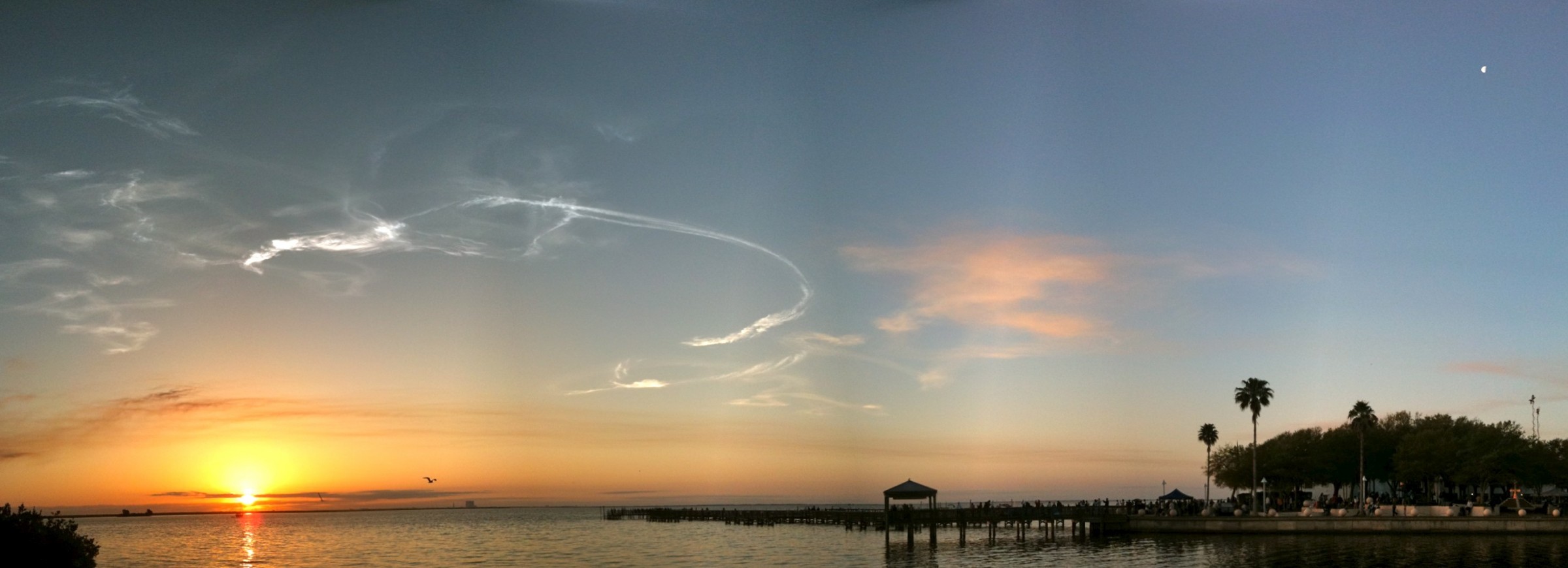Voters approved most water-related initiatives on the November 8 ballot.

Sunrise in Titusville, Florida. On November 8, 2022, voters there approved an amendment to the city charter to include a right to clean water. The amendment passed with 82 percent support. Photo courtesy of Flickr/Creative Commons user beleaveme
By Brett Walton, Circle of Blue – November 10, 2022
Amending a Florida city’s charter to include a right to clean water: an overwhelming yes.
Increasing income taxes on California’s wealthiest residents to pay for electric vehicles and wildfire prevention: a solid no.
Regulating groundwater extraction in southeast Arizona: yes and no.
Water, in different forms, was on the ballot in state and local races this year. Based on election night totals, voters approved most water-related initiatives.
State-level measures had mixed results.
In California, 59 percent of voters rejected Proposition 30, which would have established a trust fund for electric vehicle infrastructure and wildfire prevention by raising taxes on household incomes above $2 million a year.
Two other state initiatives were a success.
Fifty-nine percent of New Yorkers approved a $4.2 billion environmental bond. Projects eligible for funding include removing old dams, buying out flood-prone properties, improving water quality, conserving land, restoring wetlands, and planting trees in cities.
And in New Mexico, 65 percent of voters authorized a constitutional amendment that will allow the use of state funds to provide essential household services such as water, sewage, electricity, and internet. Before the amendment takes effect, the Legislature must pass laws that define eligible projects.
Local races also resulted in changes to foundational documents.
The landslide victory came in Titusville, Florida, a city 40 miles east of Orlando. More than 82 percent of voters approved a charter amendment that grants residents a right to clean water. The charter functions as the town constitution. The amendment was on the ballot because of a deterioration in the local environment. Titusville sits next to Indian River Lagoon, an expansive waterway fouled by toxic algae blooms that are indirectly killing manatees. The blooms prevent sunlight from reaching seagrasses that manatees eat. Amendment proponents hope it functions as a legal tool for environmental protection.
Farther west, groundwater regulation in southeastern Arizona appeared headed to a split decision.
Voters in Willcox and Douglas basins were asked whether new restrictions should be placed on groundwater use. Because of large-scale farm irrigation in the region, wells have gone dry and the land has compacted, in some cases cracking highways.
In Willcox basin, more than 61 percent of voters rejected a proposal to regulate groundwater.
Voters in Douglas basin felt differently. Fifty-two percent approved more restrictions on groundwater extraction. Even though outside money poured in, only people registered to vote within the boundaries of the groundwater basins could cast a ballot.
And in five Wisconsin counties, residents were asked their opinion on clean water in a non-binding advisory vote. Should the state establish such a right in its Constitution?
In all five counties — Adams, Bayfield, Green, Juneau, and Outagamie — voters approved the measure by at least a four-to-one margin. It continues a trend in the state. Five other Wisconsin counties approved similar resolutions in earlier elections.
Though the measure does not change the law, advocates with River Alliance of Wisconsin, the group supporting the local campaigns, hope the results send a message to state lawmakers.
Brett writes about agriculture, energy, infrastructure, and the politics and economics of water in the United States. He also writes the Federal Water Tap, Circle of Blue’s weekly digest of U.S. government water news. He is the winner of two Society of Environmental Journalists reporting awards, one of the top honors in American environmental journalism: first place for explanatory reporting for a series on septic system pollution in the United States(2016) and third place for beat reporting in a small market (2014). He received the Sierra Club’s Distinguished Service Award in 2018. Brett lives in Seattle, where he hikes the mountains and bakes pies. Contact Brett Walton




